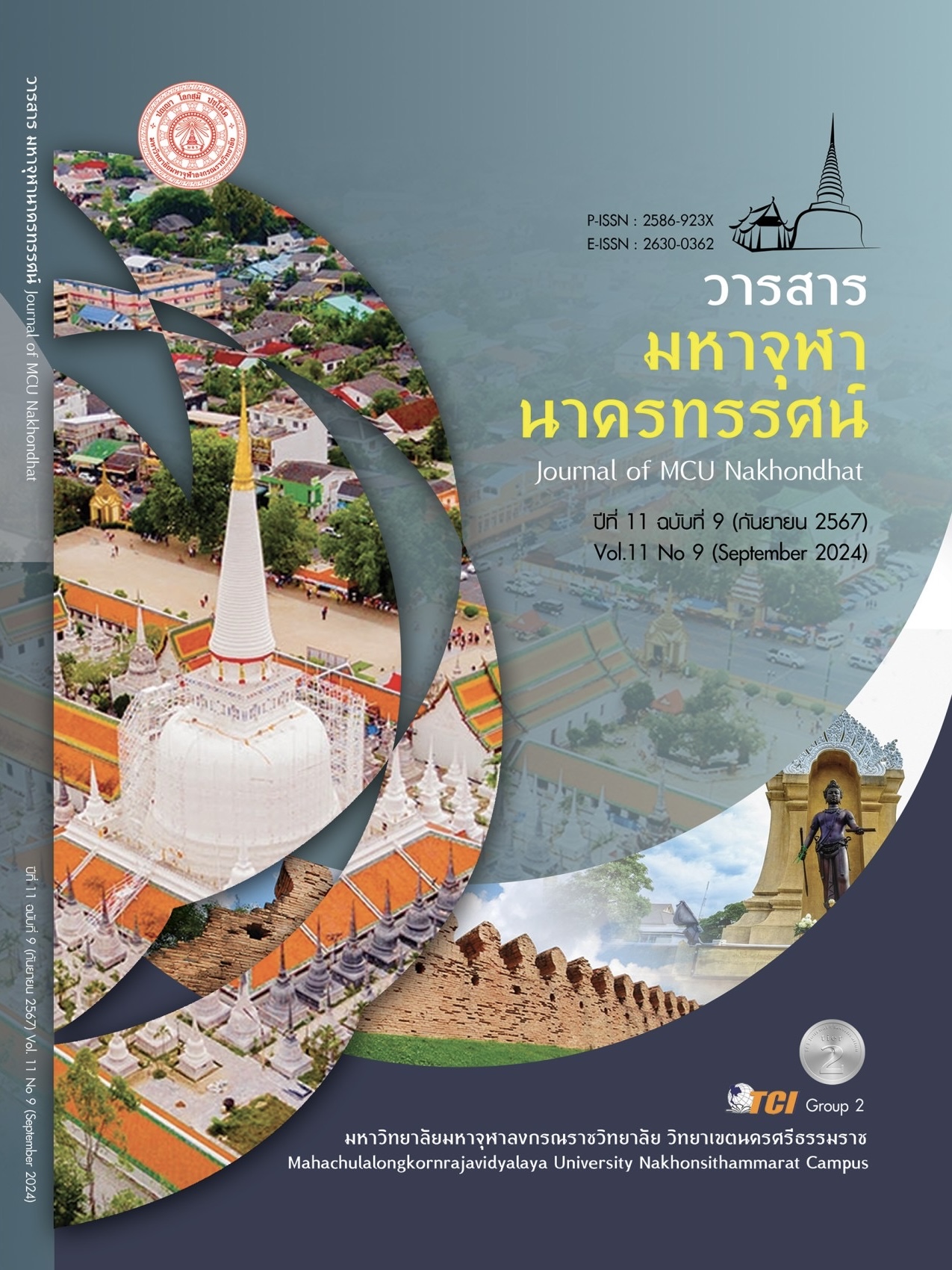NEW ACADEMIC MANAGEMENT GUIDELINES OF EDUCATIONAL ADMINISTRATORS UNDER NONTHABURI PRIMARY EDUCATIONAL SERVICE AREA OFFICE
Main Article Content
Abstract
This research aimed to study 1) The components of new academic administration of educational institution administrators. The sample consisted of 128 school directors and deputy directors. The sample size was determined according to the Krejci and Morgan tables using stratified random sampling. The instrument used was a questionnaire. The statistics used were mean and standard deviation, and 2) New academic administration guidelines for school administrators. The group of information providers consisted of 5 school directors with outstanding performance. The instrument used was an interview, with content analysis of the data. The research results found that 1) The components of the new academic administration guidelines of educational institution administrators were overall at a high level ( = 3.83, S.D. = 0.51), when considering each aspect, in conclusion, the aspect of measurement, evaluation and transfer of learning results has the highest average value, the aspect of learning process development, the aspect of educational institution curriculum development, the aspect of educational supervision, the aspect of development and promotion of learning resources, and the aspect with the lowest average value is development and use of educational technology media, and 2) New academic administration guidelines for school administrators include analyzing the school context to determine the vision, mission, goals, strategies, and planning to achieve the objectives by implementing the mission and goals with the systematic management process (PDCA), providing positive reinforcement to the workers, monitoring, inspecting, collecting defects for development, and solving problems that may occur, using the performance results as a guideline for continuous and systematic school development, using the participation process of network partners to develop the quality of academic work according to the educational management standards, using technology and innovation to effectively manage academic work, and using new techniques and methods to measure and evaluate academic work.
Article Details

This work is licensed under a Creative Commons Attribution-NonCommercial-NoDerivatives 4.0 International License.
References
กระทรวงศึกษาธิการ. (2551). หลักสูตรแกนกลางการศึกษาขั้นพื้นฐาน พุทธศักราช 2551. กรุงเทพมหานคร: โรงพิมพ์คุรุสภาลาดพร้าว.
กระทรวงศึกษาธิการ. (2566). แถลงข่าวผลการประเมิน PISA 2022. เรียกใช้เมื่อ 6 ธันวาคม 2566 จาก https://pisathailand.ipst.ac.th/news-21/
ฐาปนันท์ กันยา และพรทิพย์ สุริยาชัยวัฒนะ. (2558). “การบริหารงานวิชาการและประสิทธิผลของโรงเรียนสังกัดสำนักงานเขตพื้นที่การศึกษาสุพรรณบุรี เขต 3”. วารสารวิจัยและพัฒนา วไลยอลงกรณ์ ในพระบรมราชูปถัมภ์ สาขามนุษยศาสตร์และสังคมศาสตร์, 10(2), 101-110.
ประภัสรา โคตะขุน. (2554). Active Learning คืออะไร. เรียกใช้เมื่อ 21 กรกฎาคม 2554 จาก http://prapasara.blogspot.com/2011/09/active-learning.html
พระมหาปริญญา เตชปญฺโญ (ปราบชมพู). (2556). การบริหารงานวิชาการของครูโรงเรียนประถมศึกษา สังกัดสำนักงานเขตจอมทอง กรุงเทพมหานคร. ใน วิทยานิพนธ์พุทธศาสตรมหาบัณฑิต สาขาวิชาการบริหารการศึกษา. มหาวิทยาลัยมหาจุฬาลงกรณราชวิทยาลัย.
ระเบียบ วิเศษรัมย์. (2556). ปัญหาและแนวทางการพัฒนาการบริหารงานวิชาการของโรงเรียนประถมศึกษาอำเภอศรีราชา สังกัดสำนักงานเขตพื้นที่การศึกษาประถมศึกษาชลบุรี เขต 3. ใน วิทยานิพนธ์การศึกษามหาบัณฑิต สาขาวิชาการบริหารการศึกษา. มหาวิทยาลัยบูรพา.
สมบัวคำ ชุมจันทร์. (2555). ปัญหา แนวทางการพัฒนาการบริหารงานวิชาการโรงเรียนมัธยมศึกษา จังหวัดอุทัยธานี สำนักงานเขตพื้นที่การศึกษามัธยมศึกษา เขต 42. ใน วิทยานิพนธ์การศึกษามหาบัณฑิต สาขาวิชาการบริหารการศึกษา. มหาวิทยาลัยบูรพา.
สำนักงานคณะกรรมการประถมศึกษาแห่งชาติ. (2546). แนวดำเนินการของสถานศึกษาเพื่อจัดกิจกรรมเสริมประสบการณ์พัฒนาคุณภาพภายในสถานศึกษา. กรุงเทพมหานคร: องค์การรับส่งสินค้าและพัสดุภัณฑ์.
โสภา วงษ์นาคเพ็ชร์. (2553). การบริหารงานวิชาการกับประสิทธิผลของสถานศึกษาขั้นพื้นฐาน สังกัดสำนักงานเขตพื้นที่การศึกษาสุพรรณบุรี เขต 2. ใน วิทยานิพนธ์ศึกษาศาสตรมหาบัณฑิต สาขาวิชาการบริหารการศึกษา. มหาวิทยาลัยศิลปากร.
Cronbach, L. J. (1997). Essentials of psychological testing (3rd ed.). New York: Harper Collins.
Krejcie, R. V. & Morgan, D. W. (1970). Determining Sample Size for Research Activities. Educational and Psychological Measurement, 30(3), 607-610.
Minudin, O. B. (1987). The role of the secondary school principals as perceived by secondary school principals in Sadas Malaysi. Dissertation International Abstracts, 47(7), 2403-A.


